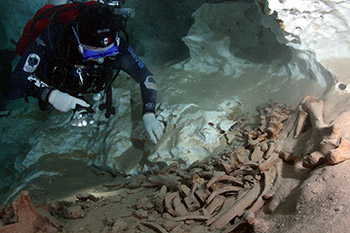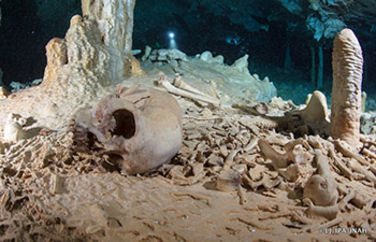- Funding opportunities for Mexico
- Political framework
- Priorities of the cooperation
- Highlights of the bilateral cooperation
- Studying without borders
- Disaster response from space
- Diving for science
- Funding the cooperation with Mexico
- The role of the International Bureau
- Scientific and Technological Cooperation (STC) between Germany and Mexico
Funding opportunities for Mexico
Within the framework of bilateral cooperation in research and education, the exchange of scientists between Germany and Mexico in collaborative projects is supported by various funding instruments.
Further information about the Science and Technology Cooperation (STC) between Germany and Mexico is available here.
Political framework
Mexico is one of the BMBF’s priority partner countries in Latin America. Germany and Mexico have maintained a close and successful cooperation in research, science and education for many years now. This cooperation is based on the joint inter-governmental agreement on science and technology cooperation (STC) of 1974. The political responsibility in Mexico lies with the Ministry of the Exterior (SRE) and the 'Instituto Mexicano para la Cooperación Internacional' (IMEXCI) founded in 1998.
On behalf of the foreign ministry, the Mexican National Council on Science and Technology (CONACYT) is the coordinating and funding authority for the STC. CONACYT is the most important technical partner of the BMBF. The 2002 Science Act turned CONACYT into an independent authority reporting directly to the president.
The research cooperation projects are bilaterally financed by the BMBF and the Mexican research council CONACYT. In the joint projects, each side covers the expenses for their respective scientists.
For the period 2019-2024, the National Development Plan (Plan Nacional de Desarrollo, PND) provides general orientation to the national science and innovation policy, while the Special Programmes for Science, Research and Innovation (Los Programas Nacionales Estratégicos, PRONACES) indicate key research and innovation policy objectives on specific national issues, such as increasing knowledge transfer and improving regional development anda far-reaching transformation of society. The 10 priority topics of PRONACES – such as protection of the environment, water supply, urban development and strengthening democracy – are now considered priorities for funding future research projects and scholarships.
Priorities of the cooperation
At the meetings of the bilateral commission on science and technology cooperation, the Federal Ministry of Education and Research (BMBF) and the Mexican Foreign Ministry (SRE) together with the 'Instituto Mexicano para la Cooperación Internacional' (IMEXCI) agree upon future cooperation priorities. The STC with Mexico focuses on environmental research, climate and sustainability, aerospace technology, life sciences and bioeconomy, as well as on cooperation in university education and vocational training.
Vocational training is crucial for both countries: In 2019, the Federal Ministry of Education and Research (BMBF) and the Federal Ministry for Economic Cooperation and Development (BMZ) signed a Memorandum of Understanding on vocational training cooperation with the Mexican Ministry of Education (SEP) and the Mexican Ministry of Foreign Affairs (SRE). The aim is, among other things, to expand the quantity and qualitiy of dual vocational training and to meet the demand for qualified skilled personnel.
On this basis, the BMBF commissioned the German Office for International Cooperation in Vocational Education and Training (GOVET) and the BMZ to support the German Corporation for International Cooperation (GIZ) in developing the Mexican model of dual vocational training (MMFD). The AHK Mexico have advised the Mexican Ministry of Education and the Employers Confederation of the Mexican Republic (COPARMEX) on the introduction and expansion.
To support the development of dual vocational training in Mexico, the Federal Ministry of Research is funding several projects for the implementation of dual training elements and for vocational training research in Mexico. The ministry is currently funding two research projects (2019-2022): 'DualReg' is researching conditions for successful international vocational training cooperation, which should be applicable to both industry and the tourism industry. 'KuPraMex' analyses four case studies (tourism, administration, technology and gastronomy) to examine the inherent logic, mechanics and functionality of non-academic work cultures in Mexico.
In addition, the BMBF and the SEP have been strengthening their cooperation in the field of higher vocational education and dual higher education since 2018. The aim is to promote permeability between initial training and technical further training (technician, master craftsman) and technical, academic education. The Memorandum of Understanding (MoU) on higher vocational education was extended for a further four years at the STC meeting in April 2021.
Highlights of the bilateral cooperation
Studying without borders
The German Higher Education Consortium for International Cooperation (DHIK) is receiving funding by BMBF to expand the cooperation with the Mexican university ITESM (Instituto Tecnológico y de Estudios Superiores de Monterrey). The project 'Mexican-German University Cooperation (MDHK) as a strategic element of the internationalisation of HAW' is funded with the aim of further developing the existing double degree programs until the end of 2023. The project coordinator is the consortium leader of the DHIK, the Saarland University of Applied Sciences (HTW Saar). As part of the MDHK, seven joint bachelor's and master's courses in the usual engineering courses, the development of content for other STEM courses and specialist disciplines such as international business will be introduced. Students from both countries are to receive a German and a Mexican university degree at the same time. In order to guarantee practical training for the students, industry is also involved.
Disaster response from space
In Mexico, the German Aerospace Center (DLR) closely cooperates with the Mexican authorities and research institutions as well as the European Space Agency, ESA. Together, they have set up a data receiving station in Chetumal on the peninsular of Yucatan. This station can be used to receive and analyse information sent by satellites. As such, it will contribute to environmental protection in Mexico and neighbouring regions. In addition, it enables quicker and more targeted action in response to natural disasters such as fires or flooding. In 2014, ownership of the ground receiving station was passed to the Mexican Agency for Space Travel, AEM. AEM is now also responsible for operating and maintaining the station, while the DLR continues to support the research activities.
Germany and Mexico are jointly contributing to climate protection. They have formed the 'German-Mexican Climate Protection Alliance' to support the Mexican government in developing and implementing its climate protection programme.
Diving for science
 Giant sloth from El Pit (skeleton at least 10,000 years old)
Giant sloth from El Pit (skeleton at least 10,000 years old)An outstanding German-Mexican research project headed by the University of Heidelberg had focused on 'Prehistoric Finds from the Pleistocene-Holocene Transition Period in the Underwater Caves of the Yucatán Peninsula'. The project funded by the Federal Ministry of Education and Research (BMBF) has led to new surprising discoveries about the peopling of the American continent. Until now, scientists believed that humans first migrated to North America via the Bering Strait 11,000 years ago and then settled on the continent. New discoveries of fossils from the caves below Yucatán challenge this hypothesis. The results of the research so far suggest that humans already lived in Mexico 13,000 years ago - thousands of years before the high culture of the Mayas. It is not yet clear where these settlers came from.
The scientific work and findings have already been presented to the public and are exhibited in museums. Exhibitions took place at the State Museum of Natural History in Karlsruhe (SMNK) and at Mexico’s largest natural history museum, MUDE, in Saltillo.
Funding the cooperation with Mexico
To support networking, the Federal Ministry of Education and Research (BMBF) publishes calls for proposal every year together with the Mexican partner, CONACYT. Funding allows research groups from Germany and Mexico to collaborate in joint projects and to exchange researchers. Furthermore several research projects are funded by the technical departments of BMBF. DAAD and DFG also have designated funding programmes with Mexican partners.
The role of the International Bureau
The bilateral cooperation between the governments and the research and development institutions in Germany are also supported by the International Bureau (IB).
Scientific and Technological Cooperation (STC) between Germany and Mexico
Within the framework of the bilateral cooperation in education and research between Germany and Mexico, the exchange of scientists in international collaborative projects will be funded. Upon request, allowances can be granted for staff, mobility and material costs within the framework of a bilateral cooperation project (research funding programme). In individual cases, bilateral workshops on topics of strategic interest can also be supported.
Type of support
As a general rule, support will be given in the form of staff and mobility aid and grants. This means that the IB generally subsidises the costs of German project partners.
Mobility projects
Applications for the research funding programme can only be submitted in the context of a funding announcement published by the BMBF. Funding announcements include bilaterally agreed key areas of focus – with regard to BMBF specialised programmes – and are usually published annually in summer. The funding programme stipulates that at least one partner each from Germany and Mexico jointly develop an application, which the German partner must then submit to the International Bureau (IB) and which the Mexican partner must then submit to the competent Mexican partner organisation (CONACYT).
Currently open funding announcements contain further information on the priorities and application process. Before submitting an application, we recommended to contact the scientific contact person at the IB, Dr Inge Lamberz de Bayas.
Your Mexican partner can find information on the corresponding programme by the Mexican National Science and Technology Council (CONACYT) at the programme website.
Measures to initiate themes of particular interest to the BMBF
In coordination with the International Bureau, in individual cases, bilateral workshops on topics that are of particular strategic interest to the BMBF can also be fiunded. These workshops are to be geared towards bringing together partners in research areas relating to specialist programmes of the BMBF and of the European Framework Programme for Research. As a general rule, support will be granted in the form of mobility aid and, in special cases, grants (in connection with the preparation and implementation of the workshop).
The conception and preparation of such workshops will take place in coordination with the BMBF. Hence, please contact IB specialist Dr Inge Lamberz de Bayas before applying.








